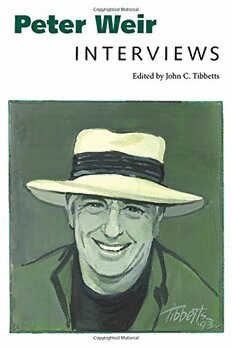Table Of ContentPeter Weir: Interviews
Conversations with Filmmakers Series
Gerald Peary, General Editor
This page intentionally left blank
Peter Weir
IntervIews
Edited by John C. Tibbetts
University Press of Mississippi / Jackson
www.upress.state.ms.us
The University Press of Mississippi is a member
of the Association of American University Presses.
Copyright © 2014 by University Press of Mississippi
All rights reserved
Manufactured in the United States of America
First printing 2014
∞
Library of Congress Cataloging-in-Publication Data
Weir, Peter, 1944–
Peter Weir : interviews / edited by John C. Tibbetts.
p. cm. — (Conversations with filmmakers series)
Includes bibliographical references and index.
Includes filmography.
ISBN 978-1-61703-897-6 (cloth : alk. paper) — ISBN 978-1-61703-898-3
(ebook) 1. Weir, Peter, 1944– Interviews. 2. Motion picture producers and
directors—Australia—Interviews. I. Tibbetts, John C. II. Title.
PN1998.3.W44A5 2014
791.4302’33092—dc23 2013039761
British Library Cataloging-in-Publication Data available
“When I waked, I cried to dream again!”
—Shakespeare, The Tempest, III. ii. 152–55
“He who does not imagine in stronger and better lineaments, and in
stronger and better light than his perishing mortal eye can see, does not
imagine at all. The painter of this work asserts that all his imaginations
appear to him infinitely more perfect and more minutely organized
than anything seen by his mortal eye.”
—William Blake
This page intentionally left blank
Contents
Foreword by David Thomson ix
Introduction: “Unmet Friends”: Encounters with Peter Weir xiii
Chronology xxxi
Filmography xxxv
Peter Weir: Reclaiming a Sydney Boyhood 3
John C. Tibbetts / 2012
Peter Weir: Snapshots in Time 6
John C. Tibbetts / 2012
Peter Weir: Early Days 40
Sue Mathews / 1985
Small Screens and Big Screens: Television and Film 47
Graham Shirley / 1991
The First Features: The Cars That Ate Paris 70
Tom Hogan / 1973
“Weir, Weird, and Weirder Still”: The Riddle of Hanging Rock 79
David Castell / 1976
Years of Living Dangerously: The Last Wave, The Plumber, Gallipoli, The
Year of Living Dangerously 85
Sue Mathews / 1985
Interview with Peter Weir 105
Luisa Ceretto and Andrea Morini / 1999
vii
viii contents
Peter Weir: Master of Unease 111
Terry Dowling and George Mannix / 1980
Towards the Center 133
Tom Ryan and Brian McFarlane / 1981
The Swizzle Stick: Peter Weir and Hollywood Genres 148
Jonathan Rayner / 1993
The Iceman Cometh: Mosquito Coast 161
Digby Diehl / 1986
Fearless: The Poetry of Apocalypse 167
John C. Tibbetts / 1993
Poetry Man: Dead Poets Society 175
Nancy Griffin / 1988
Weir’s Worlds: The Truman Show 183
Virginia Campbell / 1998
This Is Your Life: The Truman Show 191
Eric Rudolph / 1998
He’s Fought His Own Way Back to Work 200
Terrence Rafferty / 2011
“I Am Your Eyes”: Interviews with Russell Boyd, ACS, ASC 204
John C. Tibbetts / 2012
Appendix: Notes on Gallipoli 240
Interview with Executive Producer Francis O’Brien
Peter Weir’s Anzac Lecture
Additional Sources 253
Index 255
Foreword
David Thomson
“I’m master in the darkroom, stirring my prints in the magic developing
bath. I shuffle like cards the lives that I deal with. Their faces stare out at me.
People who will become other people. People who will become old, betray
their dreams, become ghosts.”
—Billy Kwan, The Year of Living Dangerously
In a few years he will be seventy. He does not seem like a movie director.
He is not overloaded with himself. He is not always on interview alert.
But since 1974, he has made fourteen feature films. He has been nomi-
nated for the Best Director Oscar four times, though he has never won.
By and large, he lives in the Australia where he was born, and many of his
pictures have involved profound journeys, whether it is a gang of school-
girls pristine in white going to Hanging Rock in the great heat of Austra-
lia or a group of people walking from Russia to India to get out of the way
of war. But not every journey is simply physical. In Fearless, The Truman
Show, and The Mosquito Coast (at least) the most demanding search is
inward, through harrowing ordeal, technological barriers, and alarming
violence to the location of the soul. No film by Peter Weir has ever been
predictable or expected. The time he takes to deliver a picture seems to
demand nothing less than his immersion in a subject. And so, quietly, as
it were, or with his characteristic humility, he has stayed away from the
busy world of reputations while building the unquestioned status of one
of the great directors still at work.
His range is always more than we bargained for. His tone is modest,
watchful, ironic, and patient. There is no sense of the bursting egotist in
Weir. Yet somehow his body of work seems to rival the largest, most un-
ruly and energized figures in film history—Abel Gance, Fritz Lang, von
Stroheim, Welles, or Kurosawa. By the time he does his next film he is
likely to be in his seventies, but who can doubt that that picture will be
daring, challenging, and unlike anything anyone has done before? Four-
teen films in thirty-eight years does not allow for small talk or routine
projects.
ix

